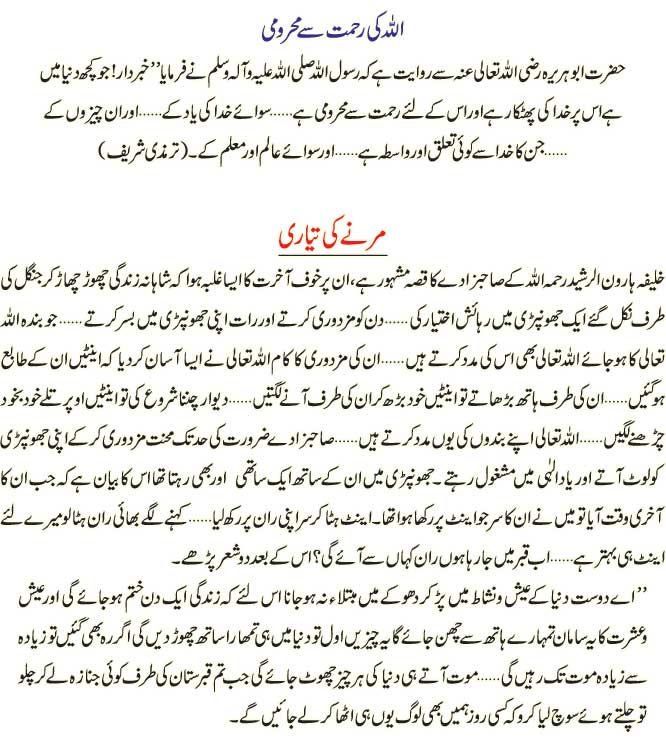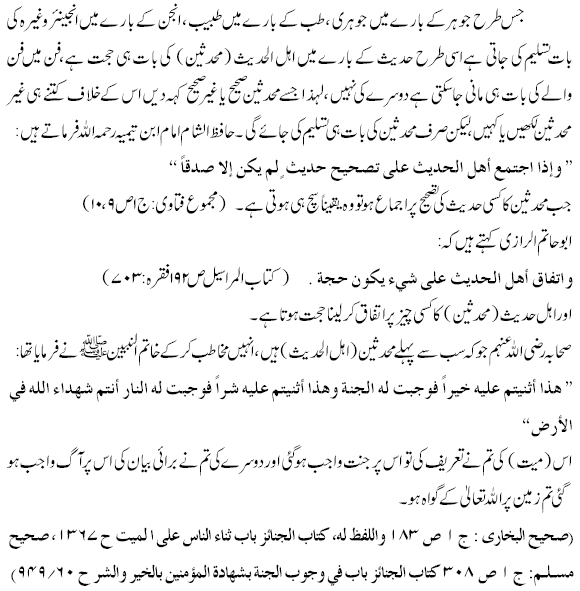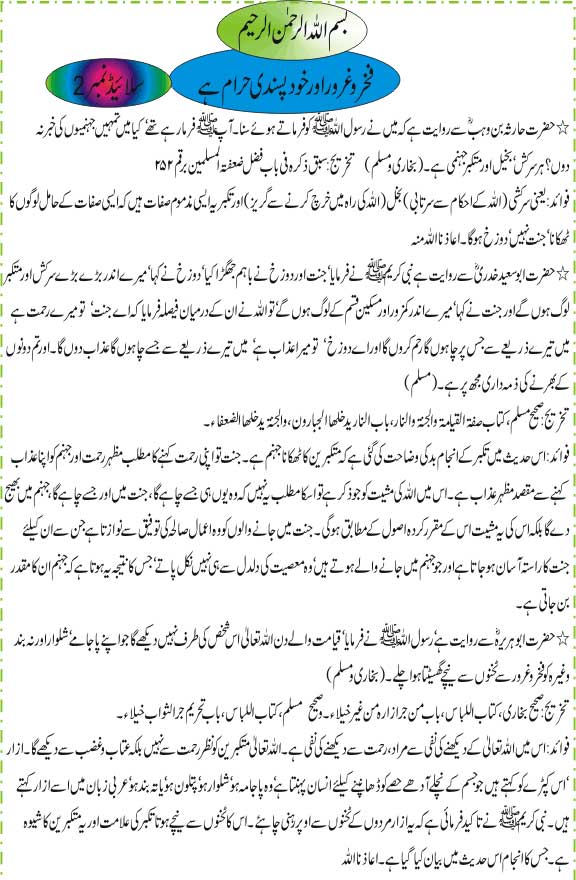
Allah Ki Rahmat Say Mahroomi
Repent Before You Regret
Why should Allah punish you if you have thanked (Him) and have believed in Him? And Allah is Ever All-Appreciative (of good), All-Knowing. (An-Nisaa‚ 4:147)
People are created with many weaknesses and imperfections. Throughout our lives, we forget many things and make countless mistakes. However, through repentance, which Allah grants us as a great favor, it is always possible in this world to correct our mistakes. Indeed, the world is created just for this purpose: We are trained, put to test, and purified of our mistakes in this world. It is likely that we may deeply regret our mistakes or the way we have led our lives. However, it is always possible to make up for this regret. After having lived through this regret, we can ask for repentance and hope for Allah’s forgiveness.
In the Qur’an, Allah gives the glad tidings that He will forgive any sin provided one repents sincerely. Allah knows our inner thoughts and every word we keep to ourselves. He knows whether we are true to Him or not. Allah, in the Qur’an, describes His closeness to His servants:
Your Lord knows best what is in your inner selves. If you are righteous, then, verily, He is Ever Most Forgiving to those who turn unto Him again and again in obedience, and in repentance. (Al-Israa‚ 17:25)
Yet, another important fact surfaces here: After death, it is not possible to make up for the mistakes and sins committed in this world unless Allah wills otherwise. So not a single moment do we have to lose. Minutes pass by in a blink of an eye and with every moment passing, we draw even closer to death. Furthermore, we can never foresee when death will confront us. Its date, hour, and minute can never be known. We all will certainly die one day and will give an account of our deeds in the presence of Allah.
For this reason, man must always bear in mind that he may soon die. If he is not to regret in the Hereafter, he must reconsider his life. If it were the time to meet the angels of death right now, would you be able to give an account of all the years you have spent in this world? What have you done so far to earn the consent of Allah? Have you been meticulous enough in fulfilling Allah‚s commands?
Fever, A Blessing In Disguise
Fever wipes out one’s sins and rids his body of dead substances and germs. It is a blessing in disguise.
The Prophet (peace be upon him) said: “When a believer gets sick or feverish, it is like metal when put on fire, the bad is gone, and the good remains.” (Al-Bayhaqi)
He (peace be upon him) also describes the intensity of fever by saying: “Fever is coal from hell, get rid of it by using cold water.” (Ibn Majah)
The Prophet (peace be upon him) forbade the cursing of fever by saying: “Do not curse a fever because it abolishes sins like fire abolishes dirt from iron.” (Ibn Majah)
The cure the Prophet (peace be upon him) told us for fever 1400 years ago is still practiced as one of the best ways to reduce fever.
A bacterial or viral infection usually raises the temperature of a person. Antibiotics are useless with viral infections, such as influenza and the common cold, although the patient might sweat and have a very high fever. Putting cold pads on a patient’s forehead is used by doctors in several hospitals through medicines like aspirin and paracetamol are abundant.
Using water to reduce fever is not limited to using cold pads. Drinking a lot of fluids is also helpful. This is also understood from the wordings of the Prophetic narration: “cool it with water.” Water is either what the patient drinks, what is given intravenously, or what the patient puts on his face or body to cool the fever.
Another scientific miracle can be found in the Prophet’s statement, “the bad is gone and the good remains.” To understand this, let’s look at what fever really is.
Fever occurs when the body temperature rises above normal (37C). There is an area in the brain that is a temperature regulator.
When a germ enters the body, it starts secreting toxins. Toxins affect the temperature regulator causing its temperature to rise. The substances that cause this rise in temperature are called pyrogens. Pyrogens are caused not only by germs but also by the ruined tissues in the body after being affected by germs.
When the temperature rises in the temperature regulator, the rest of the body has to comply. It increases its temperature in response. Soon, the whole body feels feverish and the patient’s temperature rises.
When the inflammation worsens, the germs increase and consequently ruin the tissues. The germs and the pyrogens will find the body’s defense system ready to attack and eat the by-products of the germs and rid the body of them. While doing this, it releases to the body fluids a substance called leukocyte pyrogens or endogenous.
Therefore, the fever remains while the body is cleansing itself of the by-products, confirming again the Prophetic narration.
Business Ethics In Islam
As Muslims, we have to adhere to ethical standards, not only in business but also in all aspects of life. Both business and ethics are interrelated. There is a reference to this point in the Qur’an: For you in the Messenger of Allah is a fine example to follow. (Al-Ahzab 33:21).
It is worth stressing here that when Muslims stick to ethics in their daily lives, they will become good examples to emulate in today’s world. They will help rectify some aspects of the distorted image of Islam in today’s world and thus they will become worthy ambassadors of their religion.
Allah Almighty says: And to the Madyan (Midian) people (We sent) their brother Shu’aib. He said: “O my people! Worship Allah, you have no other ilah (god) but Him, and give not short measure or weight. I see you in prosperity and verily, I fear for you the torment of a Day encompassing. And O my people! Give full measure and weight in justice and reduce not the things that are due to the people, and do not commit mischief in the land, causing corruption.“ (Hud 11:84-85)
Prophet Shu`aib (peace be upon him) was a great prophet of Allah. He was sent to the people of Madyan around the time of Prophet Abraham (peace be upon him). Prophet Shu`aib was sent among people who were very much involved in the business. These people were very proud of their business acumen and success, but they were dishonest. He told them to observe ethics in business. They became very angry with him and told him, “Don’t mix religion with business.” The Qur’an tells us that Allah’s punishment came upon those people and only Prophet Shu`aib and his followers were saved.
It is indeed important that every man must adhere to ethical standards in the business. Business and ethics are not separate, rather they are interconnected. Allah says in the Qur’an:“Indeed in the Messenger of Allah (Muhammad, peace be upon him) you have a good example to follow . . .” (Al-Ahzab 33:21).
Prophet Muhammad (peace be upon him) was an ideal human being in every respect. He was the best teacher, preacher, and guide; the best statesman, lawgiver, judge, diplomat, negotiator of treaties, and military commander; the best family man, a good husband, a compassionate father and grandfather, a good neighbor, and friend of his people. He was also a very honest and successful businessman.
Prophet Muhammad was chosen by God to be His last Prophet and Messenger at the age of 40. Before that, he was very much involved in the business. He was born in Makkah, which was a popular trade center in Arabia. Caravans from Syria in the north and Yemen in the south used to pass by Makkah. Prophet Muhammad would join in these caravans. It is reported that he traveled to Syria, Yemen, Bahrain, and many other places in Arabia in these caravans. Some historians have also suggested that he probably traveled to Iraq and Ethiopia.
Muhaddiseen

Muhaddiseen
Do You Really Want Paradise?
‘I want to go to Jannah (Paradise)’ should be our goal in life. It should be written in bold letters on our foreheads so that it serves a constant reminder for us. The Prophet (peace be upon him) has left with us a very small key to Jannah, which we Muslims today have become oblivious of. Just like you need a key to open your car’s door, or house door, or office door; similarly you need a key to open Jannah to you. What is this key?
The Noble Prophet (peace be upon him) said, “Whoever goes down a path/road searching for knowledge, Allah will make it easy for him the road to Paradise.” (Sahih Muslim, Vol.3, Hadith no. 99)
Traveling on the path to knowledge refers both to walking or driving along an actual pathway, such as going to conferences or the local mosque whenever there is an Islamic lecture or seminar. Searching also entails, a metaphysical road, such as studying and memorizing the Qur’an and Hadith. Not just memorizing like a parrot, but understanding it and acting upon it.
For those who seek knowledge, Allah will make their learning easier, clearing the way for him, and smoothing his journey to Paradise. This is why some of our pious predecessors used to say, “Is there anyone seeking knowledge so that we can assist him in finding it?”
Brothers and sisters, be LOVERS of Knowledge, be seekers of Knowledge. “Yes, where is my Qur’an, where is my Hadith Bukhari!” Let’s get up every morning with a purpose: to seek Jannah by seeking Knowledge. Knowledge is also the shortest path to Allah. Whoever travels the road of knowledge reaches Allah and Paradise by the shortest route. Knowledge also clears the way out of darkness, ignorance, doubt, and skepticism. This is why Allah called His Book “Light.”
Knowledge is the ROAD to Paradise, and Islam is the vehicle that takes you to this destination of Paradise. Just like you get in a car to go from one destination to another, but how? By finding out the directions to get there, either by seeing a map or asking someone. Similarly, our Qur’an and Hadith are our maps, and our scholars are the people who give the directions from this map to get to our ultimate destination, Paradise.
Ask yourself, “Is Paradise easy?” Have you ever seen how easy it is for some brothers and sisters to memorize the whole Qur’an by heart? Have you ever seen how easy it is for some of us to study the Qur’an and Hadith for hours and hours, while others cannot even open the Qur’an or Hadith even once a year or month? Why?
- July, 24
- 2139
- Paradise-Hell
- More
Do Not Get Frustrated When There Is Delay In Accepting Your Supplications
Abu Hurairah (May Allah be pleased with him) reported: The Messenger of Allah (PBUH), “The supplication of every one of you will be granted if he does not get impatient and say (for example): `I supplicated my Rubb but my prayer has not been granted’.” [Al-Bukhari and Muslim].
The narration of Muslims is: “The supplication of a slave continues to be granted as long as he does not supplicate for a sinful thing or for something that would cut off the ties of kinship and he does not grow impatient.” It was said: “O Messenger of Allah! What does growing impatient mean?” He (PBUH) said, “It is one’s saying: `I supplicated again and again but I do not think that my prayer will be answered.’ Then he becomes frustrated (in such circumstances) and gives up supplication altogether.”
Abu Umamah (May Allah be pleased with him) reported: The Messenger of Allah (PBUH) was asked: “At what time does the supplication find the greatest response?” He (PBUH) replied, “A supplication made during the middle of the last part of the night and after the conclusion of the obligatory prayers.” [At-Tirmidhi].
`Ubadah bin As-Samit (May Allah be pleased with him) said: The Messenger of Allah (PBUH) said, “Whenever a Muslim supplicates Allah, He accepts his supplication or averts any similar kind of trouble from him until he prays for something sinful or something that may break the ties of kinship.” Upon this, someone of the Companions said: “Then we shall supplicate plenty.” The Messenger of Allah (PBUH) said, “Allah is more plentiful (in responding).”
[At-Tirmidhi].
Commentary: We learn from this Hadith that prayer (supplication) is beneficial to us in any case, because Almighty Allah either grants the prayer we make, or if the supplication is not being accepted, He removes some future trouble that was destined for us, or He grants us in full in the Hereafter.
A Muslim should never feel shy of praying to Allah. In fact, he should persistently pray because there is no end to His Treasures.
Ibn `Abbas (May Allah be pleased with them) said: The Messenger of Allah (PBUH) used to say when he was in distress: “La ilaha illallahul-Azimul-Halim. La ilaha illallahu Rabbul-`Arshil-`Azim. La ilaha illallahu Rabbus-samawati, wa Rabbul-ardi, wa Rabbul-`Arshil-Karim. (None has the right to be worshiped but Allah the Incomparably Great, the Compassionate. None has the right to be worshiped but Allah the Rubb of the Mighty Throne. None has the right to be worshiped but Allah the Rubb of the heavens, the Rubb of the earth, and the Rubb of the Honorable Throne).”
[Al-Bukhari and Muslim].
Commentary: The only medicine in a time of distress is the remembrance of Allah Whose Help alone should be sought. This Du`a contains words that glorify Allah and exalt Him far above all else. It is desirable to recite these words when one is in distress as this is exactly what the Prophet (PBUH) used to recite in such situations
Paradise – Sexual Haven For Men?
First, we human beings have to remember that we have limited knowledge and perceptions. The things of the hereafter are beyond our understanding. That does not mean that Paradise and Hell are not physical. It is wrong to think that our next life will be only spiritual. We are told that we will be resurrected and re-created, but life in Paradise will be unlike life here. We will eat and drink but there will be no filth or dirt. Our bodies will not excrete wastes nor will they grow old.
Not only our physical bodies but also our psychology (or nature) will be different. The Qur’an tells us that there will be no vanities or hard feelings in Paradise. Those who are blessed enough to enter will have all they desire and there will be no jealousy.
Second, it is not important to understand exactly what Paradise and Hell will be like. It is important to know how to develop our relationship with God so that He will reward us with Paradise.
If we learn all the details of what life in Paradise will be like but fail to worship and serve God, then our knowledge is useless.
If a man in this world is allowed to have up to four wives (if he treats them equally), what is so wrong with him having more than that in the next life? Remember, our bodies and psychologies will be different and we cannot compare our life here with our life in the hereafter.
There is another Hadith that believes women in Paradise will have a higher status than even the houris. The believing women will say, “We shall have eternal life and will never die; we are the gentle ones who will never despair; we have settled down and shall never depart; we are contented and shall never be dissatisfied; blessed are we and blessed are our spouses…” (At-Tabarani, summarized in A Thematic Commentary on the Qur’an by Sheikh Muhammad Al-Ghazali).
From that, we can judge that the believing women will not be dissatisfied if their husbands also have houris. Why should we judge life in Paradise by the standards of our lives here?
The Qur’an does tell us that we will be greeted with the word “Peace!” when we enter Paradise. We should not question God’s wisdom in making us in the nature we are now or in re-creating us in the nature we will have. We know that He is the Most Generous and Most Merciful, and we have no right to question what He chooses to give us in Paradise. Our focus should be on worshiping and serving Him, developing our relationship with Him so that we may hope for His generous reward of Paradise.
- July, 22
- 3030
- Paradise-Hell
- More
Fakhar-O-Guroor Aur Khud Pasandi Haraam Hay

Fakhar-O-Guroor Aur Khud Pasandi Haraam Hay
How To Achieve Inner Peace
It is important to remember that inner peace comes from Allah. It does not come from material things. It does not come from drugs or painkillers. It does not come from a sinful lifestyle. Unless our relations with Allah are good, we can never have real inner peace. In order to have inner peace, we must :
Have strong faith and trust in Allah. Make Dhikr of Allah as much as we can. Dhikr brings comfort. We must follow the right path of Islam. Neither misfortune nor prosperity should turn you away from Islam.
Be with good people and be good to others. We must always say good words and do good deeds. Deeds of charity bring real inner peace.
What we do not like others to do to us, we should not do to others.
Be most forgiving. Forgiveness is the best healer and it first heals the person who forgives.

